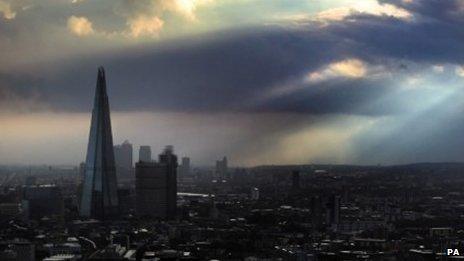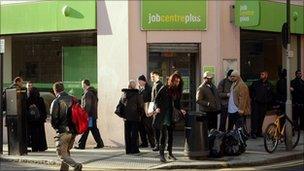More than a quarter of Londoners 'in poverty'
- Published

The report's author said London's poor were hidden from view by the "extraordinary images" conjured up by the Shard and the City
Although London is leading the country out of the recession it is not lifting Londoners out of poverty, a report suggests.
The capital has problems with child poverty, young adult unemployment, low pay and high housing costs, according to London's Poverty Profile., external
The study shows 28% of people in London are in poverty, seven percentage points higher than the rest of England.
The report was produced by think tank the New Policy Institute.
It was commissioned by Trust for London, an independent charitable foundation.
The survey uses the official definition of poverty, which is having a household income that is less than 60% of the national median income that year.
Of the 20 English local authorities with the highest levels of child poverty, seven are in London, the study shows.

The unemployment rate among 16 to 24 year olds has risen to 25%
The unemployment rate in London at 7% is still higher than the England average, while in the Olympic boroughs of Newham and Barking and Dagenham it is 10% higher than any of the major English cities.
The number of 16 to 24-year-olds living in London has increased to one million but unemployment for this age group has risen from 15% to 25% in the last 10 years, the report adds.
'Hidden from view'
At the lower end of the housing market, rents in London are twice as high as the England average.
Average monthly rents are £475 in England compared with £950 in outer London and £1,300 in inner London.
A quarter of all households in the capital rely on housing benefit to meet their housing costs, compared with a fifth in the whole of England.
The level of rents combined with the restrictions on housing benefit mean that large parts of London are now unaffordable to low-income households, the report suggests.
Trust for London chief Bharat Mehta said: "London's economy may be doing better than the rest of the country but that obscures the fact it has the highest poverty rate.
"Londoners are trying hard but are getting stuck; with many being impacted by high housing costs and housing benefit reforms, unemployment and low pay.
"To tackle London's poverty and inequality, policymakers must focus on solutions such as building more affordable housing and encouraging employers to pay a Living Wage."
Author of the report Hannah Aldridge added: "The London most visitors see - the West End, Westminster, the City - has ever less of its poverty.
"The London they don't see has ever more," she added.
"More likely to be in work and living in private rented accommodation, London's poor lead ordinary lives which are hidden from view by the extraordinary images conjured up by the Shard and the City."
The Mayor of London spokeswoman said: "The mayor is doing everything in his power to support hard-working Londoners, create job opportunities and maximise affordable housing.
"He has increased the London living wage to £8.55 an hour and is on target to deliver 100,000 affordable homes by the end of his two terms.
"The mayor continues to lobby the government on behalf of all Londoners for the critical funding and investment needed to help people facing financial hardship."
- Published20 February 2013
- Published13 January 2013
- Published5 November 2012
- Published16 October 2012